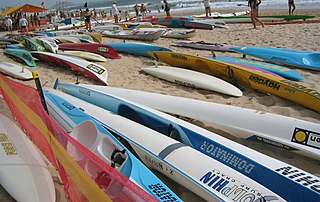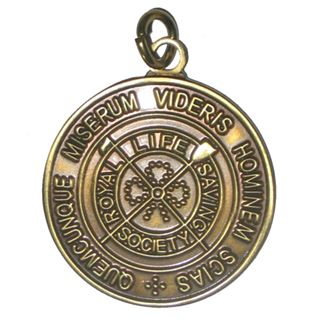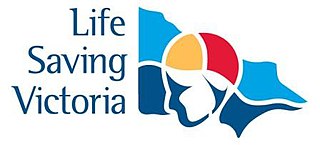
Surf lifesaving is a multifaceted social movement that comprises key aspects of voluntary lifeguard services and competitive surf sport. Originating in early 20th century Australia, the movement has expanded globally to other countries, including New Zealand, Ireland, South Africa, and the United Kingdom. Surf lifesavers in Australia are colloquially known as "Clubbies".

A lifeguard is a rescuer who supervises the safety and rescue of swimmers, surfers, and other water sports participants such as in a swimming pool, water park, beach, spa, river and lake. Lifeguards are trained in swimming and CPR/AED first aid, certified in water rescue using a variety of aids and equipment depending on requirements of their particular venue. In some areas, lifeguards are part of the emergency services system to incidents and in some communities, lifeguards may function as the primary EMS provider.
The Nova Scotia Lifeguard Service is a Canadian lifeguard service operating in Nova Scotia.
The Royal Life Saving Society UK is a drowning prevention charity founded in 1891 in the UK. It has had Royal Patronage since 1904.

Surf Life Saving New Zealand (SLSNZ) is the national association representing 74 Surf Life Saving Clubs in New Zealand. The organisation's motto is 'In it for Life'. This refers to both the long relationship many members have with the organisation, as well as to the organisation's purpose of preventing drowning and injury, thereby saving lives.

Swimming lessons are the process of learning to swim. In most countries there is a definition of a number of swimming levels that are reached in the process of the curriculum. The respective certificates of swimming tests are required for further training in aquatic abilities. Many countries have defined a minimum swimming level that children should reach by the end of primary education, in most cases with the help of school swimming classes being part of the normal curriculum.
The International Life Saving Federation (ILS) is an organisation for drowning prevention, water safety, lifesaving and lifesaving sports.

The Royal Life Saving Society Canada, commonly known as the Lifesaving Society or LSS, is a Canadian registered charity that works to prevent water-related injuries through various programs across Canada. The Lifesaving Society is an independent organization that is composed of ten provincial/territorial branches, tens of thousands of individual members, and over 4,000 affiliated swimming pools, waterfronts, schools and clubs. The Society helps prevent drowning and aquatic injury through its training programs, public education, drowning-prevention research, safety management and overseeing the sport of lifesaving.

Surf Life Saving Australia (SLSA) is an Australian not-for-profit community organisation that promotes water safety and provides surf rescue services.

Lifesaving is the act involving rescue, resuscitation and first aid. It often refers to water safety and aquatic rescue; however, it could include ice rescue, flood and river rescue, swimming pool rescue and other emergency medical services. Lifesaving also refers to sport where lifesavers compete based on skills, speed and teamwork. Lifesaving activities specialized in oceanic environment is called surf lifesaving or coastal lifesaving.
The Royal Life Saving Society UK awards several lifesaving awards indicating competence and ability.

National Lifeguard, commonly known as an NL or NLS, is a lifeguarding certification program in Canada, offered by the Lifesaving Society.
The Bronze Medallion, signifying a qualified lifesaver, has been a lifesaving standard award of The Royal Life Saving Society - Australia and Surf Life Saving Australia for over one hundred years. It was developed in England in 1892. It has evolved over the years to accommodate the environmental conditions of Australia.

The Bronze Medallion is the second step towards the lifeguarding certification in Canada. The award is part of the Lifesaving Society's Bronze series of awards. It teaches an understanding of the lifesaving principles embodied in the four components of water rescue education: judgment, knowledge, skill, and fitness. It is the prerequisite for Bronze Cross; Standard First Aid with CPR-C and 16 years of age are the prerequisites for National Lifeguard Service. The Bronze Medallion endurance swim requirement is 400 meters (440 yd) in 12 minutes using any combination of strokes.

The Bronze Medallion was the flagship award of the Royal Life Saving Society UK until 2012. It was open to those age 14 years of age and over, and consists of resuscitation, theory questions on water safety, self rescue, and rescue principles, and a practical swimming pool based assessment.

The drowning chain is a series of conditions that on their own, or together can lead to a person being drowned. Each link in the chain can lead on to another link, or directly to a fatal or non-fatal drowning. The chain is used by lifeguards as a basis for targeting their activity at preventing, rather than reacting to, drowning or other incidents.
The Rashtriya Life Saving Society (India) [RLSSI] is a national, non-profit, voluntary organisation dedicated to helping people to learn modern lifesaving techniques. The Society is the leading provider of training in first aid, resuscitation, water safety, life saving and life guarding skills in India. The Society is a member of the International Life Saving Federation and branch of the Royal Life Saving Society Commonwealth.

Life Saving Victoria is an Australian life saving organisation formed in 2002 from a merger of the Victorian Branch of the Royal Life Saving Society Australia and Surf Life Saving Victoria. Life Saving Victoria works to prevent drownings and other water related deaths and injuries in Victoria. Life Saving Victoria teaches local communities in Victoria about water safety, swimming and resuscitation. It also provides surf life saving services and patrols for beaches across the state. Life Saving Victoria is an emergency support agency to Victoria Police for water based emergencies.

Robert "Bob" MacKenzie Burnside was appointed the first president of the Surf Life Saving Association of America in 1964, which later became known as the United States Lifesaving Association. In 1965, he was appointed president of the National Surf Life Saving Association. In 1967, he developed the revolutionary plastic “Burnside Rescue Can”, now a standard for lifeguards worldwide and iconic symbol of beach lifeguarding. He was a champion swimmer who introduced the Malibu balsa surfboard to Australia. He wrote the History of Junior Lifeguarding.
The Water Safety Instructor (WSI) program is an aquatics program, specific to swim instructing, regulated and certified primarily through the Canadian Red Cross and American Red Cross.













